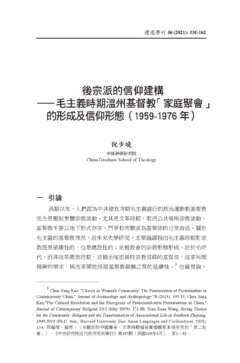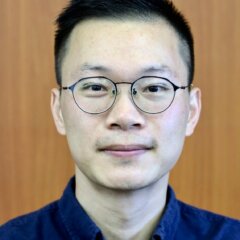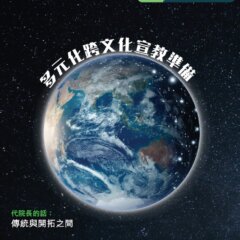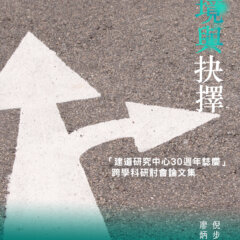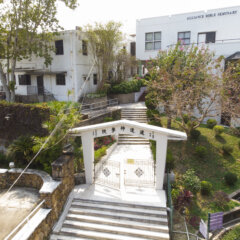後宗派的信仰建構—毛主義時期溫州基督教「家庭聚會」的形成及信仰形態(1959-1976 年) / 倪步曉
倪步曉
撮要
這篇文章探討1959 年後的毛主義期間,溫州基督教被社會政治運動取消公共宗教活動,基督徒轉向地下微型的「家庭聚會」,形成其獨特性並實踐他們信仰的形態。圍繞「家庭聚會」的信仰實踐來看,包括在苦難中的宗教調節、靈恩的形態,建構一種重新定義家庭聚會的信仰身分。即便是毛主義剝奪了基督教傳統的教堂組織中領導地位,而信徒在家庭聚會所具有的能動性也能展現自身,適應環境、保持其獨特的信仰。再則,經過毛主義的家庭聚會,非但沒有使基督徒被打壓直線下降,反而呈現出波動且發展的趨勢,這在很大程度上反映文革的社會政治環境在多變中,溫州地方政府處於派系的權力鬥爭,無法再加強破壞宗教層面的運作,卻無意中改變了家庭教會生存處境,進一步確立其後宗派的信仰形態,並從根本上構成家庭聚會的信仰底色。
ABSTRACT
This article explores after 1959, during the Maoist period, Wenzhou Christianity was removed from public religious activities by social and political movements, and Christians turned to underground miniature “family gatherings” to develop their uniqueness and to practice their faith. From the perspective of the faith practice of “family gathering”, including the religious adjustment in suffering, Charismatic form, to construct a faith identity that redefines family gathering. Even when the Maoists stripped the Christian tradition of leadership in church organizations, the activism of believers in family gatherings revealed themselves, adapted to circumstances and maintained their unique beliefs. Moreover, after the Maoist, the Christians of family gathering not only didn’t decline during the suppression in a straight line, but also showed a trend of fluctuation and development, which largely reflects the social and political environment of the cultural revolution are changeable. Wenzhou’s local government is in a factional power struggle and no longer able to strengthen the operation of the destruction of religious level, but inadvertently changed the family church survival situation, further established sectarian beliefs form, and fundamentally constitutes a faith background of family gatherings.
原載於《建道學刊》56期(2021年7月),頁 131-162。
作者簡介
倪步曉
兼任助理教授
Latest Articles
時代的迴響:王明道日記中的信仰光譜/陳智衡、倪步曉 主編
2025 年 2 月 21 日
建道通訊218期
2025 年 1 月 28 日
【代院長的話】傳統與開拓之間 / 高銘謙
2025 年 1 月 28 日
Highlights
[電子書]困境與抉擇:「建道研究中心30週年誌慶」跨學科研討會論文集/廖炳堂、倪步曉主編
2025 年 1 月 2 日
從梧州到長洲:建道神學院125年的挑戰與恩典 / 陳智衡
2023 年 10 月 1 日
微小教會的見證/高銘謙
2023 年 6 月 1 日

